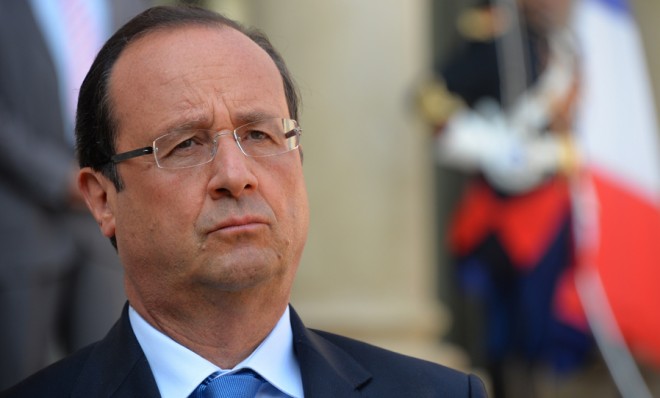Surrender monkeys no more: How France turned into a global cop
Syria is just the latest example of France's growing assertiveness on the global stage

The British are out; the French are in.
We've come a long way since 2003, when British Prime Minister Tony Blair joined George W. Bush in cheerleading for the Iraq War, while the French were mocked as "cheese-eating surrender monkeys" for refusing to join in. It was Francois Hollande, in fact, then the leader of the opposition Socialist Party, who urged France to veto any United Nations resolution authorizing an invasion of Iraq.
Ten years on, Hollande, now president, is calling forcefully for military strikes against Syria, while the British are sitting it out. How did we get here?
The Week
Escape your echo chamber. Get the facts behind the news, plus analysis from multiple perspectives.

Sign up for The Week's Free Newsletters
From our morning news briefing to a weekly Good News Newsletter, get the best of The Week delivered directly to your inbox.
From our morning news briefing to a weekly Good News Newsletter, get the best of The Week delivered directly to your inbox.
Actually, as Emma-Kate Symons argues at The Atlantic, painting the French as cowards or isolationists was always an "inaccurate and unfair caricaturing." Indeed, with hindsight it appears France's opposition to Iraq probably said more about the mission than about the French.
France has been flexing its muscles since the 2011 intervention in Libya. Then-President Nicolas Sarkozy was one of the strongest proponents of a no-fly zone and air strikes to protect Libyans from an increasingly bloodthirsty Moammar Gaddafi. The Libyan dictator was threatening "no mercy" as his troops marched on Benghazi, and Sarkozy argued that the international community had a duty to act, finally persuading a reluctant President Obama to join a coalition that succeeded in tipping the scales in favor of Gaddafi's opponents.
Then came France's invasion of Mali, its former colony, this January. Overwhelmed by Islamic militants running roughshod over Timbuktu, torching ancient libraries, and bulldozing religious shrines, the Malian government asked for French help. The intervention was seen as a stunning success, wholly owned by Hollande. French troops were in and out in just a few months, and a newly elected president was sworn in just yesterday.
Of course, Hollande didn't commit troops solely out of the goodness of his heart. There were French strategic interests at play in Mali, as Ben Makuch argues in Vice:
A free daily email with the biggest news stories of the day – and the best features from TheWeek.com
Just consider that French state-owned nuclear engineering company Areva has huge interests in neighbouring Niger (the number four producer of uranium, globally) and the nearby Central African Republic. Add to that Guinea and Mauritania's valuable iron deposits and Burkina Faso and Chad's major cotton resources, and you can do the math. If the contagion of militancy from an Islamist Malian territory spread across borders, it could legitimately threaten those vital interests. [Vice]
France also sees the unrest in Syria as a threat. First, it has historically close ties to Syria's neighbor, Lebanon. Second, as Le Monde points out, France would be affected directly should Iran take a lesson from Western inaction.
How to respond to the use of a weapon of mass destruction in the Middle East? How to avoid its use becoming commonplace? How to prevent other states from being encouraged to acquire such weapons? How to avoid Iran interpreting a lack of international response as a green light to its nuclear program? These issues interest France in particular -- not only on moral grounds, but on strategic grounds. France is a nuclear power, and nuclear proliferation undermines its deterrent capability. And they interest Europe in general, which is more threatened than the United States by the use of WMD in our immediate neighborhood. [Le Monde]
Still, just as the British public didn't share Blair's enthusiasm for bombing Saddam Hussein, the French people are not as excited as their president at the idea of French intervention in Syria. Polls show that while 55 percent of the French think that somebody should punish the Assad regime for allegedly using chemical weapons, just 40 percent of them think that somebody should be France.
It turns out that the country that avoided the Iraq War may nonetheless have its own form of war fatigue. As Jerome Fourquet says in Le Huffington Post, the French "may have the feeling that France has recently been at the forefront enough — whether Libya or Mali — and on the Syrian issue, it's time for other members of the international community to get involved."
Susan Caskie is The Week's international editor and was a member of the team that launched The Week's U.S. print edition. She has worked for Radio Free Europe/Radio Liberty, Transitions magazine, and UN Wire, and reads a bunch of languages.


